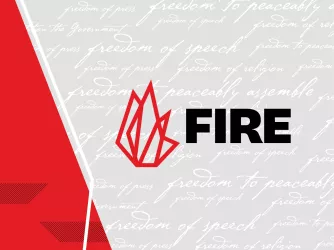Table of Contents
Remembering Frederick Douglass, free speech’s greatest defender

The year was 1860, and the clouds of a looming war hovered above the nation. The American people had elected Abraham Lincoln, an anti-slavery politician from Illinois, to become the 16th president of the United States in November. Over the following weeks, southern states began to call state conventions intending to secede from the Union.
In this tense political climate, renowned abolitionist and orator Frederick Douglass joined a group of fellow abolitionists at Boston’s Tremont Temple Baptist Church to commemorate the first anniversary of the death of firebrand abolitionist John Brown. The topic of discussion was “How Can Slavery Be Abolished?” A violent mob greeted the small gathering by taking the stage and shouting down the meeting, ending the whole affair. The city’s mayor and police department did nothing to stop it.

Such instances were sadly commonplace in nineteenth-century America. In the years since the adoption of the Bill of Rights, the question of what to do with American slavery had reached a frustrating stalemate. The escalating conflict between abolitionists and pro-slavery factions often resulted in the suppression of free speech and press.
Southern states went as far as to impose the death penalty for the circulation of pamphlets advocating for abolition or emancipation. In Congress, a gag rule was passed in 1836 prohibiting the discussion of slavery. The previous year, Andrew Jackson proposed a federal bill that would have banned the post office from receiving, mailing, or delivering publications on the subject of slavery. Outside of legislative halls, pro-slavery mobs destroyed public property, burned newspaper offices to the ground, and killed abolitionists on both sides of the Mississippi.
This was the world that Frederick Douglass sought to reshape with his devotion to the principles of free speech. A recent episode of “So to Speak: The Free Speech Podcast” explored how Douglass and fellow abolitionists such as William Lloyd Garrison, Lysander Spooner, Angelina Grimkè, and John Quincy Adams relied upon the nation’s rugged free speech culture to advance the cause of human freedom. For Douglass and many other abolitionists, free speech was the most effective weapon in their crusade to end slavery.
Douglass’ remarks 163 years ago were not just for the people of Boston. They were for the whole nation. They are words that ring true today.
And he proved his commitment to free and open discourse time and time again. Unphased by the violent mob in Boston, Douglass delivered a lecture at the city’s Music Hall six days later — 163 years ago this weekend. Before adjourning for the evening, he addressed the restlessness of the previous week and the successful efforts to shout down the Tremont Temple event.
The result? Possibly the most important defense of free speech in American history:
No right was deemed by the fathers of the Government more sacred than the right of speech. It was in their eyes, as in the eyes of all thoughtful men, the great moral renovator of society and government. Daniel Webster called it a homebred right, a fireside privilege. Liberty is meaningless where the right to utter one’s thoughts and opinions has ceased to exist. That, of all rights, is the dread of tyrants. It is the right which they first of all strike down. They know its power. Thrones, dominions, principalities, and powers, founded in injustice and wrong, are sure to tremble, if men are allowed to reason of righteousness, temperance, and of a judgment to come in their presence. Slavery cannot tolerate free speech. Five years of its exercise would banish the auction block and break every chain in the South. They will have none of it there, for they have the power. But shall it be so here?
[ . . . ]
Equally clear is the right to hear. To suppress free speech is a double wrong. It violates the rights of the hearer as well as those of the speaker. It is just as criminal to rob a man of his right to speak and hear as it would be to rob him of his money. I have no doubt that Boston will vindicate this right. But in order to do so, there must be no concessions to the enemy. When a man is allowed to speak because he is rich and powerful, it aggravates the crime of denying the right to the poor and humble.
Douglass’ “Plea for Freedom of Speech in Boston” is the rarest type of political oratory: a speech that is somehow both of a particular time and timeless. Using free speech principles as a philosophical thread, he connected himself to both the Founding Generation and the then-present day, much like Lincoln would do three years later at Gettysburg. In his remarks, we see shades of our current political moment and some of the most precise arguments against self-censorship and the heckler’s veto.

A Plea For Freedom of Speech in Boston
Frederick Douglass joined a group of fellow abolitionists at Boston’s Tremont Temple Baptist Church to commemorate the first anniversary of the death of firebrand abolitionist John Brown.
Douglass often argued that freedom of speech was essential in maintaining one’s liberty. In the minds of Douglass and other abolitionists, the free exchange of ideas produced greater political freedom. And if the mind is free to think, it can improve its thinking through debate and appeals to reason. This is why Douglass philosophically opposed self-censorship and shoutdowns: to shout a speaker down is not an appeal to reason. Douglass rightly noted that the efforts to shout down events with which one disagrees amounts to intimidation. It forces an opinion on others — the exact opposite of persuasion.
Douglass’ remarks 163 years ago were not just for the people of Boston. They were for the whole nation. They are words that ring true today, quoted and emulated by everyone from academics to rapper Killer Mike at FIRE’s gala this past April. Delivered then to a few, Douglass’s message about the importance of free speech in a democratic society has become an example for us all to look to, learn from, and aspire toward.
To celebrate the 163rd anniversary of this remarkable speech, take some time this weekend and discover Douglass’ words for yourself: You’ll be glad you did.
Read Frederick Douglass A Plea for Freedom of Speech in Boston
Recent Articles
Get the latest free speech news and analysis from FIRE.

FIRE sues Bondi, Noem for censoring Facebook group and app reporting ICE activity

Spain considers banning teens from social media and holding tech executives criminally responsible for ‘hate speech’

Statement on grand jury’s refusal to indict lawmakers over video urging troops to ignore illegal orders


